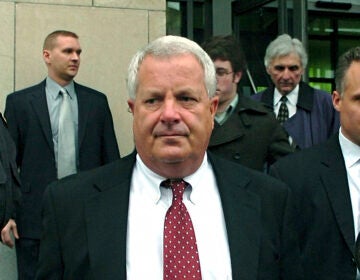Pa. House re-introduces contentious bills to reinstate mandatory minimum sentences
House Republicans are holding fast to one of their longtime, tougher-on-crime priorities.

Shown is the Pennsylvania Capitol building in Harrisburg, Pa., Monday, July 10, 2017. (Matt Rourke/ AP Photo)
On Tuesday afternoon, a state House committee is slated to start voting on a slew of bills related to gun violence.
Three of those bills are a familiar sight in the chamber.
Versions of the measures, which would create mandatory punishments for people convicted of certain gun-related crimes, have been repeatedly reintroduced — so far, unsuccessfully — several sessions in a row.
Mandatory minimums first caught on in Pennsylvania in the 1990s. In those years the Commonwealth, like many states, started meting out tougher sentences based on factors like proximity of a firearm or possession of a certain quantity of drugs.
But states began changing course after a 2013 U.S. Supreme Court decision. Justices had ruled that harsh minimums weren’t constitutional if the factors that triggered them — like the presence of drugs or a gun — hadn’t been found material to the underlying case by a jury.
In 2015, it was Pennsylvania’s turn. The state Supreme Court found that many of the commonwealth’s mandatory sentences — specifically, ones related to gun and drug crimes — were unconstitutional based on the federal court’s ruling.
Todd Stephens, a Republican from Montgomery County, has been leading his caucus’s effort to reinstate mandatory minimums without running afoul of that decision ever since.
“We are safer when violent criminals are in state prison than when they’re on the streets of Philadelphia, Reading, Harrisburg and other urban areas across Pennsylvania,” he said.
One of Stephens’ bills would impose minimum sentences for gun crimes and for drug crimes committed with firearms. Another would create minimums for people who possess guns illegally, and a third would make sure people who target multiple victims get multiple sentences.
The House has passed Stephens’ bills several sessions in a row, but the Senate never has.
Jenn Kocher, the spokeswoman for the latter chamber, said senators “look forward to reviewing whatever the House sends us.”
Stephens said this year, he thinks his bills might find a place in a larger compromise on gun violence.
“Look, if we want to take gun violence seriously and address it, we need to ratchet up the penalties that these violent criminals are facing when they’re sentenced on these offenses,” he said.
Corrections Secretary John Wetzel has long opposed mandatory minimum sentences, whether they comply with state and federal court rulings or not.
Democratic Governor Tom Wolf feels similarly. A spokesman for Wolf said in a statement, the bills would just inflate prison populations and make incarceration more expensive, not cut down on gun violence.
“Judges are more than capable and in the best position to evaluate sentencing on a case-by-case basis,” J.J. Abbott said. “Mandatory minimums are simply not a solution to gun violence.”
WHYY is your source for fact-based, in-depth journalism and information. As a nonprofit organization, we rely on financial support from readers like you. Please give today.





